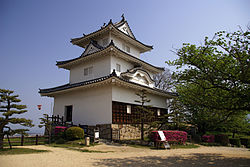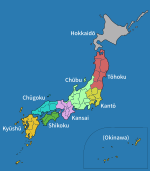Marugame Castle
| Marugame Castle 丸亀城 | |
|---|---|
| Marugame, Kagawa Prefecture, Japan | |
 The tenshu (keep) of Marugame Castle | |
| Site history | |
| Built by | Nara Motoyasu |
| In use | 1587–1615; 1644–1870 |
Marugame Castle (丸亀城, Marugame-jō), also known as Kameyama Castle and Horai Castle, is a hirayama shiro (castle situated on a hill surrounded by a plain) located in Marugame, Kagawa Prefecture, Japan.
History
The first fortifications built on the site that would later become Marugame castle were erected by the Nara clan led by Nara Motoyasu, who in turn were retainers of the Hosokawa clan during the Muromachi Period. Little evidence of this exists today, however.

The roots of the current castle lie in 1587, when Marugame Castle was the residence of the lord of the Sanuki Province, Ikoma Chikamasa.[1] In 1597, Chikamasa constructed Takamatsu Castle as his new location from which to rule from and turned Marugame Castle over to his son, Ikoma Kazumasa.[2] Kazumasa immediately began renovating the castle, and made it into a formidable fortification. In 1615, however, due to a shogunal decree that each province could have but one castle, Marugame Castle was dismantled.
In 1641, a small section of western Sanuki (including what was left of Marugame Castle) was granted, as a fief, to Yamazaki Ieharu for his valor in the 1638 Shimabara Rebellion. Ieharu re-built the castle on the ruins of the original and most of what stands today dates from his reconstruction, which he completed in 1644. However, in 1658, the castle was turned over to the Kyōgoku clan. They further improved the castle by rebuilding the Otemmon complex in 1670. The Kyōgoku managed to retain control of the castle until the Imperial Government seized control of it during the Meiji Restoration.
In 1869, a fire swept through the castle and destroyed many of the buildings.[3] This was followed by another spate of destruction when the Imperial Government destroyed much of what remained in 1870. Shortly afterward, the outer moat was filled in.
Today

Besides the stone walls, few of the buildings at Marugame Castle stand today. The Ote Ichino Gate, Ote Nino Gate, and the tenshu (keep), which underwent a major restoration in 1950, remain. These original buildings have been declared Important Cultural Properties by the Japanese government. Marugame Castle is one of only a dozen Japanese castles to have an original wooden tenshu built before 1860.[4]
The castle is preserved in Kameyama Park, and its museum is housed in the tenshu.[5]
References
Literature
- Mitchelhill, Jennifer (2013). Castles of the Samurai:Power & Beauty. USA: Kodansha. ISBN 978-1568365121.
- Motoo, Hinago (1986). Japanese Castles. Tokyo: Kodansha. pp. 200 pages. ISBN 0-87011-766-1.
External links
![]() Media related to Marugame Castle at Wikimedia Commons
Media related to Marugame Castle at Wikimedia Commons

